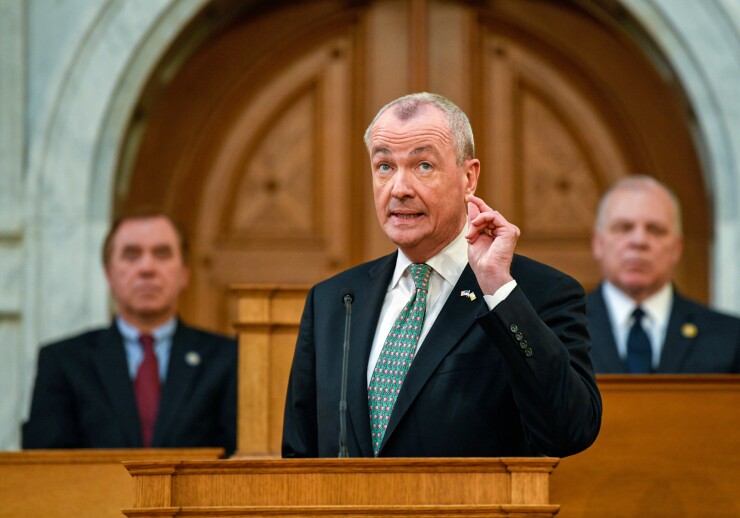A proposed public bank in New Jersey could spark an economic development boost throughout the cash-strapped state if executed properly, according to analysts.
New Jersey Gov. Phil Murphy signed an

“Public banks can help lower debt costs for local governments while generating revenues and spurring job and economic growth,” New Jersey Lt. Gov. Sheila Oliver said in a statement. “We welcome the opportunity to help lower taxes for residents in our communities while investing in the common good with loan affordability for education, infrastructure and small businesses growth.”
North Dakota is the only other U.S. state to operate a public bank backed solely by government fund deposits. The institution called the Bank of North Dakota was formed 100 years ago to help protect the state’s agricultural industry from predatory lenders. The bank touts on its
Joseph Krist, a partner at Court Street Group Research, said a public bank would enable many affordable housing projects to get off the ground through low-cost loans providing a foundation for economic development at the local government level. Krist noted that New Jersey, which has faced major budget challenges in recent years, would benefit in the long run by municipalities generating increased revenues and thus needing less state aid assistance.
“Public banks can facilitate investments in worthwhile projects that may not generate the necessary investments that private banks desire,” Krist said. “It can be a catalyst for development.”
Struggles with creating structurally balanced budgets coupled with a deep pension burden have contributed to New Jersey having the second-lowest credit ratings of the 50 U.S. states. New Jersey general obligation bonds are rated A3 by Moody’s Investors Service, A-minus by S&P Global Ratings and A by Fitch Ratings and Kroll Bond Rating Agency.
A
“In theory a New Jersey public bank could benefit the state’s general fund and its economy, as it does in North Dakota, but New Jersey isn’t North Dakota and it will have to have strong guardrails in place on governance issues, particularly given the state’s fiscal position and political landscape,” said Lisa Washburn, managing director at Municipal Market Analytics. “The downside risks of politically influenced lending decisions versus those that are principles-based and creditworthy is far greater when leveraging other people’s money.”
Murphy, a Democrat, first proposed a public bank during his run for governor in 2017 as a way to leverage some of the state’s tax revenue for projects deemed beneficial to it. The former Goldman Sachs executive will now need passage by the Democratic-controlled state senate and assembly before the concept becomes a reality.
State Sen. Anthony Bucco, R-Boontin Township, criticized Murphy’s move to establish a public bank Wednesday by noting that Vermont and Massachusetts recently decided against the move because of having existing state institutions that can provide loans. He said the New Jersey Economic Development Authority and the Higher Education Student Assistance Authority already provide functions that a state bank would offer.
“There would be a substantial risk of default on high-risk loans, with the cost falling on taxpayers since the state bank would not be FDIC insured,” Bucco said in a statement. “The truth of the matter is that new agencies run by the State have a history of falling short.”
California may also be entering the public bank space in a limited capacity after Gov. Gavin Newsom signed a new law last month permitting cities and the counties to establish their own banking institutions. The legislation caps the number of public banks at 10 statewide.
Krist said that while the farming industry drove the nation’s first state-owned bank in North Dakota a century ago, today’s public banking demand is being led largely by demands for affordable housing projects that can be difficult to launch from traditional capital sources. He stressed that if New Jersey and other states considering public banks craft measures that prevent lending abuses, public banks can serve as an economic engine to jump-start important capital projects.
“It’s always good to have institutions that can provide capital and do it in a more efficient way,” Krist said. “It eliminates a lot of the politics.”





